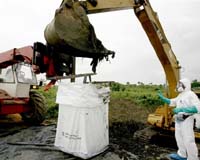| . |  |
. |
Lagos, Nigeria (UPI) Jul 21, 2010 The BP oil spill is a major tragedy for the Gulf of Mexico region, yet the people in Nigeria have had to live with similar environmental catastrophes for decades. While the BP well in the gulf may or may not be capped, oil keeps flowing into fields, rivers and lakes in the Niger Delta, where Western companies have been drilling for oil for several decades. A 2006 report compiled by international environmental groups and the Nigerian government estimated that on average, a spill the size of the Exxon Valdez has been occurring each year in the past five decades. According to environmental groups and the Nigerian government, there were more than 7,000 spills between 1970 and 2000, spewing at least 9 million barrels of crude into the delta, home to vast wetlands that form the livelihood of millions of people. But while the Deepwater Horizon spill has mobilized the entire U.S. political scene, in Nigeria, an increasing number of the population has had to suffer -- undetected by Western politicians. And that's despite the fact that the United States imports roughly 10 percent of its oil from Nigeria. "We see frantic efforts being made to stop the spill in the U.S.," Nnimmo Bassey, Nigerian head of Friends of the Earth International, recently told The Observer, a prominent British Sunday publication. "But in Nigeria, oil companies largely ignore their spills, cover them up and destroy people's livelihood and environments. The gulf spill can be seen as a metaphor for what is happening daily in the oilfields of Nigeria and other parts of Africa." Big Western oil companies including BP, Shell and Exxon Mobile operate in Nigeria; the environmental groups accuse them of being ignorant to their spills -- an estimated 2,000 contaminated sites have yet to be cleaned up. Moreover, locals and non-governmental organizations claim the companies operate old and rusty pipes and are often too slow or indifferent to reacting to spills. The many Nigerian governments of the past, which have earned billions of dollars since drilling began in 1958 but gave little to their people, have been largely unable to pressure companies into cleaning up the mess. The companies deny the allegations, arguing the spills are mainly due to acts of vandalism and terrorism, and are dealt with in a timely manner. "We have a full-time oil spill response team," a Shell spokesman told The Observer. "Last year we replaced 197 miles of pipeline and are using every known way to clean up pollution, including microbes. We are committed to cleaning up any spill as fast as possible as soon as and for whatever reason they occur." But the spill in the gulf has reduced trust in the oil companies, with some Western countries openly accusing multinationals of behaving recklessly when drilling for oil in poor countries. "Spills, leaks and deliberate discharges are happening in oilfields all over the world and very few people seem to care," Judith Kimerling, a professor of law and policy at the City University of New York and an expert on oil development in poor countries, told The Observer. "What we conclude from the Gulf of Mexico pollution incident is that the oil companies are out of control. It is clear that BP has been blocking progressive legislation, both in the U.S. and here. In Nigeria, they have been living above the law. They are now clearly a danger to the planet."
Share This Article With Planet Earth
Related Links Africa News - Resources, Health, Food
 Dutch judgment in Ivory Coast toxic waste case
Dutch judgment in Ivory Coast toxic waste caseThe Hague (AFP) July 21, 2010 A Dutch court will hand down judgment Friday in the first trial of a Swiss-based company whose chartered ship dumped waste alleged to have killed 17 people in Ivory Coast in 2006. Multinational Trafigura, waste treatment company Amsterdam Port Services (APS), and the Ukrainian captain of the Probo Koala ship were tried with three others for allegedly breaking environment and waste export law ... read more |
|
| The content herein, unless otherwise known to be public domain, are Copyright 1995-2010 - SpaceDaily. AFP and UPI Wire Stories are copyright Agence France-Presse and United Press International. ESA Portal Reports are copyright European Space Agency. All NASA sourced material is public domain. Additional copyrights may apply in whole or part to other bona fide parties. Advertising does not imply endorsement,agreement or approval of any opinions, statements or information provided by SpaceDaily on any Web page published or hosted by SpaceDaily. Privacy Statement |